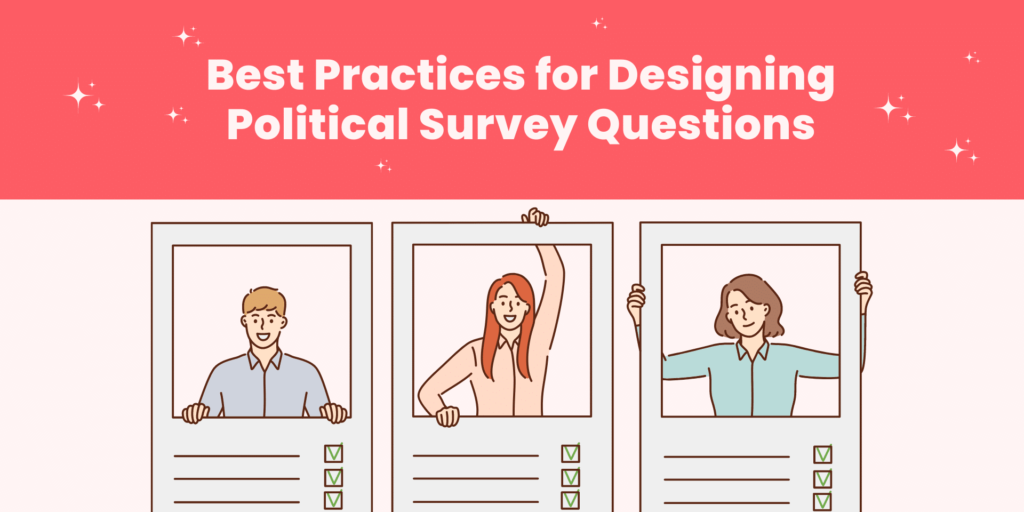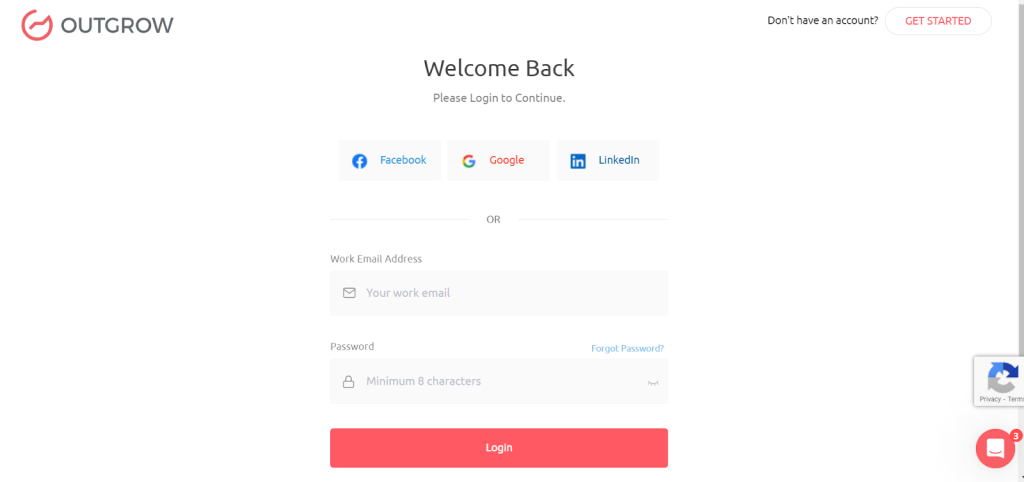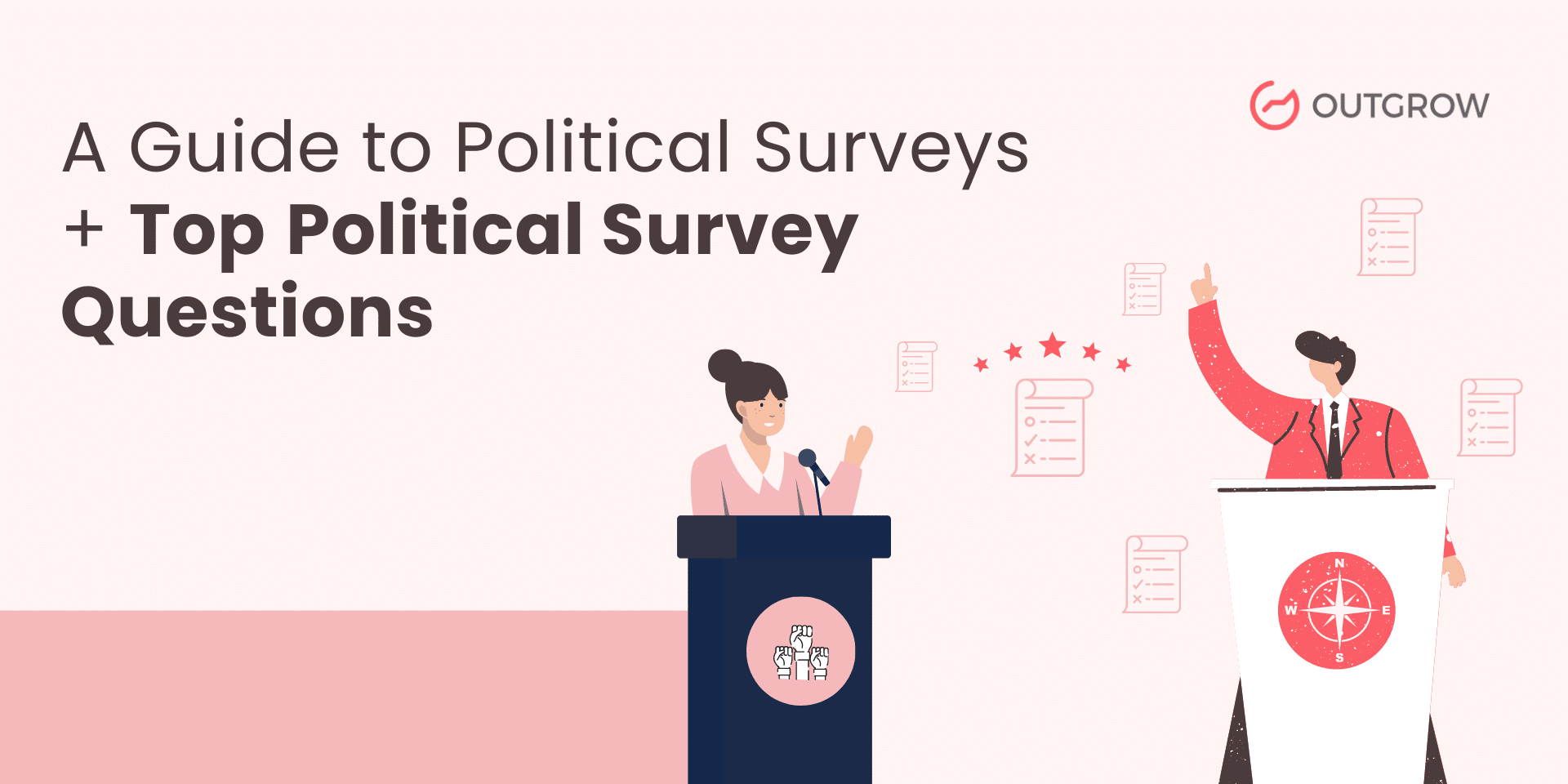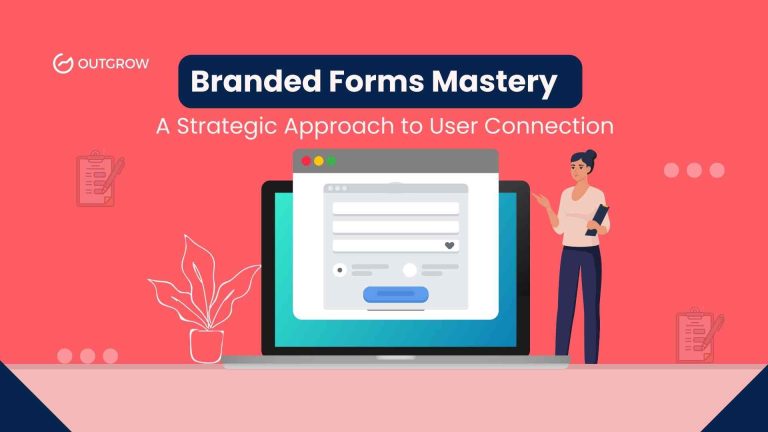A Guide to Political Surveys: 50 Political Survey Questions + Tools
Table of Contents
Conducting a political survey is an integral part of modern politics. But creating a survey that captures the voters’ spirit could be challenging. If you want to create political survey questions that accurately grasp people’s opinions, there are specific guidelines you should consider.
So in this blog, we will give you 50 question ideas and also explore some best practices and steps to create a political survey.
What Is a Political Survey?
A political survey is a way of data collection from individuals in order to understand their political opinions, attitudes, and behaviors.
Political surveys ask a series of questions that cover a wide range of topics, such as voting behavior, party affiliation, views on current political issues, and opinions on specific politicians or policies. It could also include questions that seek demographic information such as age, gender, education level, and income.
The results of political surveys can be used by political candidates, parties, and organizations to better understand their target audience and shape their campaign strategies. Additionally, political surveys can be used by researchers and academics to analyze political trends and patterns within society.
Do Read – Survey VS Questionnaire: Difference and Examples
Why Conduct Political Surveys? – The Purpose and Benefits
One notable successful political survey campaign was conducted by Obama for America campaign during the 2012 United States presidential election. The campaign employed an extensive survey strategy known as “Targeted Sharing” to gather valuable insights and engage with supporters.
The campaign utilized online surveys to collect data on voters’ priorities, policy concerns, and personal stories. They strategically designed the surveys to be engaging and interactive, making it more likely for supporters to participate and share their responses with their social networks.
Some fundamental reasons and benefits for conducting political surveys are-
1. Understanding Public Opinion
Political surveys enable the measurement of public perspectives on various political topics, such as policies, candidates, and issues. By analyzing survey data, policymakers and politicians can gain a better understanding of people’s concerns and what they value.
2. Measuring Voter Preferences
Political surveys are commonly used during election campaigns to assess voter sentiment and preferences. This information is used by candidates to shape their campaign strategies and target their messages to the voters who are most likely to support them.
3. Identifying Trends and Patterns
Through the collection of data from numerous surveys over time, analysts can track changes in public opinion on political issues. Policy makers can use this information to stay informed of the public’s evolving attitudes and respond accordingly.
4. Testing Messaging and Ideas
By testing political messages and ideas through surveys, candidates and policymakers can fine-tune their messaging to better resonate with the public. This helps to ensure that their messaging is as effective as possible.
5. Conducting Research
Political surveys are a valuable tool for investigating political phenomena, such as the effects of policies on the public and voter behavior. The results of these surveys can provide policymakers with the information they need to make informed decisions.
Best Practices for Designing Political Survey Questions

1. Conduct a Preliminary Audience Analysis
A good survey design is not about finding the right questions. It is about finding the right audience.
The best way to do that is to conduct a preliminary audience analysis and come up with a list of topics that you think your audience would find interesting and relevant. This will give you an idea of what kinds of questions they are interested in, how they prefer to learn about things, and what kind of information they are seeking.
2. Decide on a Survey Medium and Data Collection Method
The first decision to make is what type of survey will work best for your study. You’ll also need to consider your project timeline and how much data you can collect in that duration.
Furthermore, you will have to understand whether you want to use paper or electronic surveys. Electronic surveys are convenient because they allow you to collect more information from your respondents in less time. However, some find it challenging to design a survey. Would I need coding knowledge? How to share and promote an online survey? How much would a survey maker cost?
Well, if you’re looking for a no-code, easy-to-use, easy-to-share, free survey tool, check out Outgrow Survey Maker!
If you want a step-by-step guide on how to make a survey, you can check out this detailed blog.
3. Consider Using Logic Jump in Your Survey
A logic jump is a feature in surveys that allows respondents to dynamically skip or move to specific questions based on their current answers.
This can be used to improve the survey experience for respondents by making it shorter and more relevant for them. This also improves the quality of the data collected for you as users only answer the questions that apply to them.
For example, you could use a logic jump to help users skip a question about income if they have already answered that they are not employed.
Another feature you can try for specific sensitive parts is ‘skip question’. Clearly, this would help the respondent to skip any question that they don’t want to answer. This would encourage people to continue with your survey even if they are not comfortable with some questions.
4. Keep Your Questions Short, Simple, and To The Point
The best political survey questions are short, simple, and to the point. It is widely accepted that the more information you give people in a survey, the less likely they are to take your survey seriously.
Therefore, if you want your survey to be seen as an expert source of data, keep it short and to the point. This will also help you gather more accurate data.
Avoid ambiguous, misleading, or double-barreled questions as that will only confuse the reader and therefore, lead to unreliable or inaccurate data.
5. Choose the Right Response Format for Each Question
An important part of designing a survey is to choose the right response format for each question.
You can use an open-ended question, which means that the respondent has to answer in their own words. Or you can use a close-ended question, which means the respondent will be able to choose from an available list of response options.
You can also use a rating scale for comparative questions. Response formats like the Likert scale are commonly used allowing respondents to rate their level of agreement or disagreement with a statement. This format helps measure the intensity or strength of opinions on a numerical scale, providing more precise data for analysis.
There are various types of survey questions you should try out to fit your unique requirements.
6. Create a Question Hierarchy
This helps when asking multiple questions on the same topic as the respondent won’t feel confused while taking the survey. It’s important to make sure that each question relates to the others in your survey. You can also use an outline format to help with this process.
7. Test the Survey Before Sending It Out
In order to check the efficacy of the survey that you have created, it is important to test it out yourself.
Testing your survey before sending it out can help you to:
1. Enhance the quality of the data collected by identifying and fixing any problems with the survey questions, such as ambiguity, bias, or technical issues.
2. Improve the survey experience for respondents by making sure that the survey is easy to understand and complete.
3. Increase the validity and reliability of the survey results by ensuring that the survey is measuring what you intend it to measure and that the results are consistent.
Top 50 Political Survey Questions
1. What is your age?
a) 18-24
b) 25-34
c) 35-44
d) 45-54
e) 55-64
f) 65 or older
2. What is your gender?
a) Male
b) Female
c) Non-binary
d) Prefer not to answer
3. What is your race/ethnicity?
a) White
b) Black or African American
c) Hispanic or Latino
d) Asian or Pacific Islander
e) American Indian or Alaskan Native
f) Other
g) Prefer not to answer
4. What is your highest level of education completed?
a) High school or less
b) Some college
c) Bachelor’s degree
d) Master’s degree or higher
5. What is your current employment status?
a) Employed full-time
b) Employed part-time
c) Unemployed
d) Retired
e) Student
f) Other
6. Which political party do you typically support?
a) Democratic Party
b) Republican Party
c) Libertarian Party
d) Green Party
e) Independent
f) Other
7. What is your opinion on the current state of the economy?
a) Excellent
b) Good
c) Fair
d) Poor
e) Terrible
8. How concerned are you about the national debt?
a) Very concerned
b) Somewhat concerned
c) Not very concerned
d) Not concerned at all
9. How important is the issue of healthcare to you?
a) Extremely important
b) Very important
c) Somewhat important
d) Not very important
e) Not important at all
10. Should the government provide universal healthcare?
a) Yes
b) No
c) Don’t know
11. What is your opinion on the current immigration policy?
a) Too Strict
b) About right
c) Too lenient
12. Should the government provide a path to citizenship for illegal immigrants?
a) Yes
b) No
c) Don’t know
13. What is your stance on gun control?
a) Support stricter gun control laws
b) Support current gun control laws
c) Oppose stricter gun control laws
d) Don’t know
14. Should there be limits on the number of guns an individual can own?
a) Yes
b) No
c) Don’t know
15. What is your opinion on the death penalty?
a) Support
b) Oppose
c) Don’t know
16. Should abortion be legal?
a) Yes, in all cases
b) Yes, in some cases
c) No, in all cases
d) Don’t know
17. What is your opinion on same-sex marriage?
a) Support
b) Oppose
c) Don’t know
18. What is your stance on climate change?
a) A serious problem that requires immediate action
b) A problem that requires action, but not immediately
c) A minor problem that does not require immediate action
d) Not a problem
19. Should the government invest in renewable energy sources?
a) Yes
b) No
c) Don’t know
20. What is your opinion on the Paris Climate Agreement?
a) Support
b) Oppose
c) Don’t know
21. How important is civil rights to you?
a. Very important
b. Somewhat important
c. Not very important
d. Not at all important
22. Should the United States continue to support NATO?
a. Yes
b. No
c. Neutral
23. What is your opinion on foreign aid?
a. Support foreign aid
b. Oppose foreign aid
24. Should the government provide subsidies for renewable energy?
a. Yes
b. No
c. Neutral
25. How important is infrastructure to you?
a. Very important
b. Somewhat important
c. Not very important
d. Not at all important
26. Should the government increase taxes on the wealthy?
a. Yes
b. No
c. Neutral
27. What is your opinion on government regulation of businesses?
a. Support government regulation of businesses
b. Oppose government regulation of businesses
c. Neutral
28. Should there be limits on campaign spending?
a. Yes
b. No
c. Neutral
29. What is your stance on the legalization of marijuana?
a. Support legalization of marijuana
b. Oppose legalization of marijuana
c. Neutral
30. How important is education to you?
a. Very important
b. Somewhat important
c. Not very important
d. Not at all important
31. What is your stance on income inequality?
a. Support policies to reduce income inequality
b. Oppose policies to reduce income inequality
c. Neutral
32. What is your opinion on affirmative action?
a. Support affirmative action
b. Oppose affirmative action
c. Neutral
33. Should there be a minimum wage?
a. Yes
b. No
c. Neutral
34. What is your opinion on Social Security?
a. Social Security is an important program that should be expanded
b. Social Security is a flawed program that needs to be reformed or eliminated
35. Should the United States have a policy of non-interventionism?
a. Yes, the US should focus on domestic issues and avoid involvement in foreign conflicts
b. No, the US has a responsibility to promote democracy and protect human rights around the world
36. What is your stance on the war on drugs?
a. The war on drugs has been ineffective and harmful, and drug addiction should be treated as a public health issue
b. The war on drugs is necessary to reduce drug use and drug-related crime
37. How important is the issue of privacy to you?
a. Extremely important
b. Very important
c. Somewhat important
d. Not very important
e. Not at all important
38. Should the United States continue to support Israel?
a. Yes, Israel is an important ally in the Middle East and a bastion of democracy
b. No, US support for Israel undermines US relations with other countries in the region and perpetuates the Israeli-Palestinian conflict
39. What is your opinion on the use of drones for targeted killings?
a. The use of drones for targeted killings is necessary to combat terrorism and protect national security
b. The use of drones for targeted killings is a violation of international law and human rights
40. Should the US continue to maintain a military presence in Afghanistan?
a. Yes, a US military presence is necessary to prevent the resurgence of the Taliban and to protect US interests in the region
b. No, the US should withdraw its troops and let the Afghan government handle its own security
41. What is your opinion on the US’s relationship with Russia?
a. The US should work to improve its relationship with Russia to reduce tensions and promote global stability
b. The US should take a tougher stance against Russia to deter its aggressive behavior and protect US interests
42. Should the US government regulate social media platforms to address misinformation?
a. Yes, social media platforms have a responsibility to regulate content that is false or harmful
b. No, social media platforms should be allowed to operate without government interference
43. Should the US government provide free college education?
a. Yes, a free college education is necessary to promote social mobility and provide opportunities for all
b. No, a free college education is not necessary and would be a burden on taxpayers.
44. Should the US government continue to support the military-industrial complex?
a. Yes, the military-industrial complex is necessary for national defense and job creation
b. No, the military-industrial complex is a wasteful and corrupt system that harms the economy and society
45. Should the US government increase funding for public education?
a. Yes, increased funding for public education is necessary to ensure that all students have access to quality education
b. No, increased funding for public education is not necessary and would be a waste of taxpayer money
46. What is your stance on government funding for the arts?
a. The government should increase funding for the arts to promote culture and creativity in society
b. The government should decrease funding for the arts and allow the private sector to support artistic endeavors
47. Should the government increase or decrease funding for scientific research?
a. Increase funding for scientific research to promote innovation and advancements in various fields
b. Decrease funding for scientific research to reduce the budget deficit and focus on other priorities
48. What is your opinion on the use of military force to resolve international conflicts?
a. Military force is sometimes necessary to protect national interests and promote peace and stability
b. The use of military force should be avoided as much as possible and diplomatic solutions should be prioritized
49. Should the government increase or decrease spending on law enforcement and the criminal justice system?
a. Increase spending on law enforcement and the criminal justice system to promote public safety and protect communities
b. Decrease spending on law enforcement and the criminal justice system to address issues of police brutality and systemic racism.
50. What is your opinion on the use of torture in the interrogation of suspected terrorists?
a. The use of torture is never acceptable and violates basic human rights
b. The use of torture may be necessary in extreme cases to obtain critical information and protect national security
How to Create the Best Political Survey
Instead of coding and doing all the designing manually, take advantage of Outgrow’s survey maker tool.
Here’s the step-by-step guide on how you can create a survey on Outgrow –
1) Login
Log in to your Outgrow account.

2) Select Survey/Forms
After logging into Outgrow you will see all the available Content Types in Outgrow listed at the top. In this case, you need to click on Form / Survey.
3) Choose a Template
In the next step, you can choose a layout that you want to use for the survey. You can choose from 1-column, 2-column, Card Style, Paragraph Style, or Chatbot.
4) Drag and Drop Builder
This is where you’ll design your survey using the drag-and-drop builder. This builder makes your job so much easier as you just have to choose from the pre-made designs or if you want, you can create your own from scratch as well! You can enter as many questions as you want, choose their styling, and instill their responses. All done within a few minutes!
7) Configure:
Under this tab, you can change the survey’s URL according to your wish or set up Google and Facebook pixels for tracking your survey. You can also choose to send an automated email to the users or to yourself when someone takes the survey. The Outgrow builder also gives you the option to configure your embeds, HTML, and 3rd party integrations in this section.
8) Analyze
After publishing the survey, its detailed performance could be measured under the Analyze tab. You can view total visitors, traffic, and user details under this section.
If you want to get hands-on on a more detailed step-by-step guide, check out our blog on How to Create A Survey In 5 Minutes.
Conclusion
A well-designed political questions survey is a powerful tool that can help you understand your voters’ desires and preferences, and how to reach them effectively.
By leveraging the insights obtained from the political questions survey, politicians can focus their resources, messaging, and strategies in the right direction, ultimately increasing the chances of achieving positive outcomes and electoral success.
In summary, a well-designed political questions survey can serve as a guiding tool to align actions with voter preferences, leading to rewarding results for politicians and campaigns.
So, feel like creating your first Political Questions Survey?
Among different tools available in the market, Outgrow is one of the most unique kind. It assists you in streamlining the process of building engaging pieces like Surveys. The best part is that you can try it out for free with Outgrow’s 7-day free trial!




